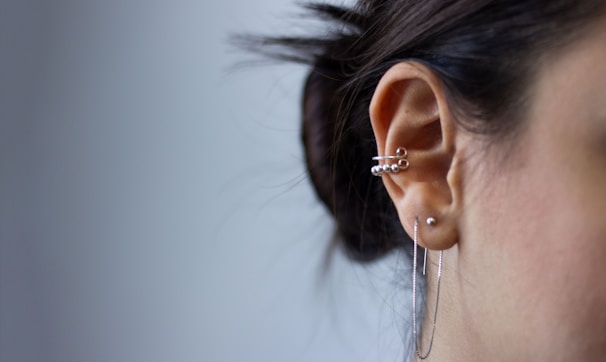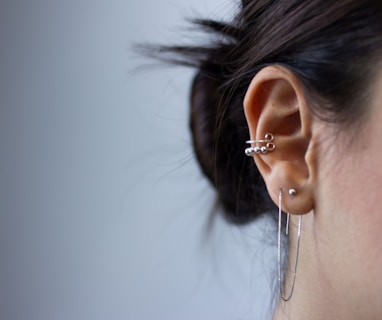Say no to cotton swabs: How to safely remove ear wax without damaging your ears
HEALTH CONDITIONS


Ear wax, also known as cerumin, is a natural substance produced by our ears' ceruminous glands. It acts as a barrier, preventing dust, dirt, and other particles from entering our ears and causing damage. When ear wax accumulates, it can cause blockages, discomfort, hearing loss, and even infection. Many people use cotton swabs to remove ear wax because they are quick and easy, but this is not recommended. Cotton swabs can actually push ear wax deeper into the ear canal, causing more blockages and possibly damaging the delicate tissues in the ear. In this article, we will explore the dangers of using cotton swabs for ear wax removal and provide safe and effective alternatives for keeping your ears clean and healthy.
Ear wax is a naturally occurring substance that protects and lubricates the ear canal. However, many people clean their ears with cotton swabs or other sharp objects, which can do more harm than good. We will discuss the risks of using cotton swabs, alternative methods for removing ear wax, and how to keep your ears healthy and free of blockages in this article.
The dangers of using cotton swabs:
Using cotton swabs or other sharp objects to clean your ears can push ear wax further into the ear canal, causing blockages and increasing the risk of infection. Additionally, these objects can damage delicate tissues in the ear, potentially causing hearing loss.
Alternative methods for ear wax removal:
There are several alternatives to using cotton swabs to remove ear wax, including:
Using ear drops
Saline solution irrigation
Utilization of a soft bulb syringe
Having a professional ear cleaning procedure performed
Using a warm washcloth to soften ear wax and allow it to naturally migrate out of the ear canal.
It is important to note that medical professionals do not recommend ear candles because they can cause injury.
How to keep your ears healthy and free of blockages:
It is critical to avoid using cotton swabs for ear wax removal in order to keep your ears healthy and free of blockages. You can also use ear drops on a regular basis to prevent buildup, eat a healthy diet to encourage ear wax production, and see a doctor if you have persistent blockages or discomfort.
Additionally, avoid loud noises and music, clean your ears with a soft cloth or towel on a regular basis, and avoid using earplugs or headphones that seal the ear canal.
Prevention of Ear Wax Build Up:
To prevent ear wax buildup, avoid cleaning your ears with cotton swabs or other sharp objects. Keep your ears dry, especially after bathing or swimming, use a humidifier to keep the air in your home moist, and avoid using earbuds or other in-ear devices excessively.
To summarize, using cotton swabs or other sharp objects to clean your ears can do more harm than good. Instead, it is critical to use alternative ear wax removal methods and to take steps to keep your ears healthy and free of blockages. You can keep your ears healthy and free of discomfort by following these guidelines.
Related Stories

CULTURENUTRITION
Why a Healthy Gut is Essential for a Healthy Mind and Body
Your gut is often referred to as your body's "second brain," and for good reason: the health of your gut has a significant impact on your overall well-being. A healthy gut promotes a strong immune system, improves digestion, and has even been linked to better mental health. In this article, we will look at the close relationship between gut health and overall health and why it is critical to keep your gut in good shape. We'll look at the role gut bacteria play in gut health and how it affects mood, sleep, and energy levels. We will also discuss the most effective ways to maintain and improve gut health, such as using probiotics, eating a fiber-rich diet, and reducing stress. Whether you're dealing with digestive issues or simply want to stay healthy, this article will provide valuable insights and actionable tips for maintaining a healthy gut and, by extension, a healthy mind and body.

CULTURENUTRITION
The Role of Vitamins and Minerals in a Balanced Diet
In this article, we will look at the importance of vitamins and minerals in a healthy diet. We'll talk about how different vitamins and minerals work together to support our health, and why it's important to get the right combination of these nutrients to be healthy. We will also give you tips and guidelines for incorporating a variety of nutrient-rich foods into your diet to ensure you get all of the vitamins and minerals your body requires. Whether you want to improve your overall health, increase your energy, or prevent chronic diseases, this article will provide you with the information you need to make informed diet decisions.

NUTRITIONCULTURE
Vitamin C Deficiency Symptoms, Food Sources, Risks and Benefits
Vitamin C is an organic compound that contains antioxidant properties. It can be found in nature in the form of fruits and vegetables. Vitamin C supports the development of epithelial tissue, which forms the protective skin on organs and vessels. Vitamin C works with manganese to form collagen, which supports the synthesis of proteins in bones, joints, tendons, and cartilage (1). Read more to discover facts and information about vitamin C.

